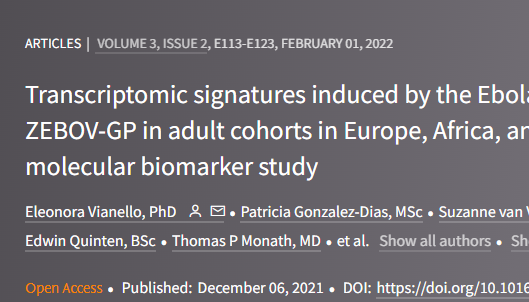Transcriptomic signatures induced by the Ebola virus vaccine rVSV-ZEBOV-GP in adult cohorts in Europe, Africa, and North America: a molecular biomarker study
Our results indicated that perturbation of gene expression peaked on day 1 and returned to baseline levels between day 7 and day 28. The magnitude of the response was dose-dependent, with vaccinees receiving a high dose (≥9 × 106 pfu) of rVSVΔG-ZEBOV-GP exhibiting the largest amplitude. The most differentially expressed genes that were significantly upregulated following vaccination consisted of type I and II interferon-related genes and myeloid cell-associated markers, whereas T cell, natural killer cell, and cytotoxicity-associated genes were downregulated. A gene signature associated with immunogenicity (common to all four cohorts) was identified correlating gene expression profiles with ZEBOV-GP antibody titres and a gene signatures associated with reactogenicity (Geneva cohort) was identified correlating gene expression profiles with an adverse event (ie, arthritis).
Authors
Vianello, Eleonora; Gonzalez-Dias, Patricia; van Veen, Suzanne; Engele, Carmen G; Quinten, Edwin; Monath, Thomas P; Medaglini, Donata; Agnandij, Selidij T; Ahmed, Rafi; Anderson, Jenna;
External link
Publication Year
Publication Journal
Associeted Project
Systems Vaccinology
Lista de serviços
-
Is the gut microbiome key to modulating vaccine efficacy?Is the gut microbiome key to modulating vaccine efficacy?
-
Toxicogenomic and bioinformatics platforms to identify key molecular mechanisms of a curcumin-analogue DM-1 toxicity in melanoma cells.Toxicogenomic and bioinformatics platforms to identify key molecular mechanisms of a curcumin-analogue DM-1 toxicity in melanoma cells.

